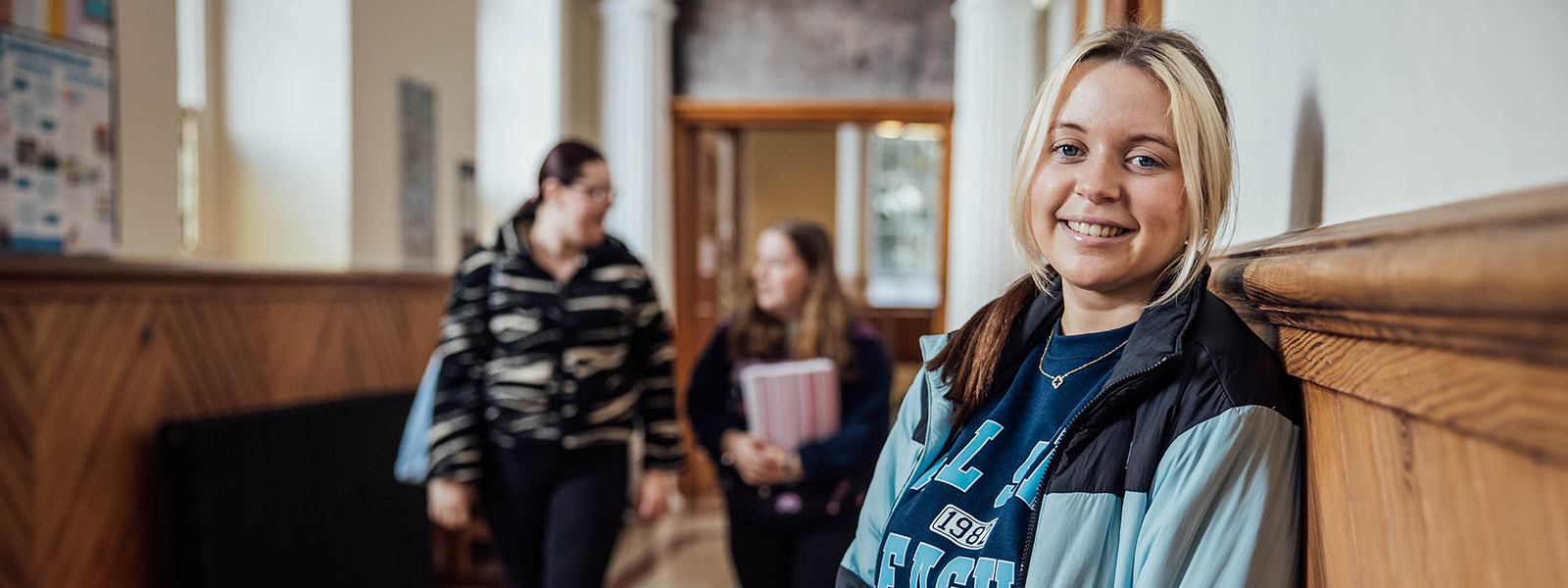BA in Education, Business Studies & Religious Studies (MI017)
CAO Round 1 Pts 2025: 346
Duration : 4 years full-time
Places Offered: Up to 30
Location: MIC Thurles
Lecture Hours: 10 approx.
Tutorial Hours: 5 approx.
Assessment:
Mixed but may include presentations, essays and exams.
- Programme Overview
- Programme Content
- Entry Requirements
- Ask a Question
Programme Overview
The BA in Education, Business Studies and Religious Studies programme (post-primary) is a four-year, full-time, undergraduate concurrent teacher education degree (Level 8), currently offered at MIC Thurles. Graduates are qualified to teach Business Studies and Religious Studies to honours Leaving Certificate level.

Why study on this programme?
Graduates of the programme will:
- Demonstrate subject knowledge, curriculum process and content, and professional knowledge
- Engage in critical and analytical thinking, problem-solving, reflection and self-evaluation
- Engage in planning, teaching, learning, assessment, classroom management and organisation for the classroom and the school as a learning organisation
- Articulate a commitment to and vision for the development of the uniqueness of the pupil in all its dimensions
- Integrate and apply knowledge skills, attitudes and values in complex and unpredictable educational settings
- Exhibit strong interpersonal skill and a readiness to be leaders and innovators of curriculum change
- Demonstrate a commitment to lifelong personal and professional development and actively participate in professional learning communities
Modules, Dissertation & Study Abroad
Students are educated in the most current methodologies and technologies available to enhance the teaching of their subject areas at post-primary level. The degree programme includes four years of modules in Business Studies and Religious Studies. These are taken concurrently with education modules which include theoretical, pedagogical and professional studies along with a number of school placement experiences.
This programme places great emphasis on teaching and research and as part of their development as research-active teachers, students undertake an Undergraduate Dissertation. The Dissertation can be in either Education or a Subject discipline. Students begin the preparation for the dissertation in Year 3 where they undertake their research methods module.
Study Abroad Options
Study abroad opportunities for short stay placements are available in Year 3. In recent years, recipients of International Scholarships have undertaken placements in Japan, Brazil, USA and across Europe, where they have immersed themselves in diverse educational practices and cultures. MIC is working with International partner universities on an ongoing basis to expand the range of International opportunities available.
School Placement
The School Placement element of the programme is designed to meet the Teaching Council’s requirements, and students will spend approximately 23 weeks in schools during the programme. This period will allow students to engage in observation, class-based and whole-school teaching and learning activities. Working in partnership with schools, the placements are designed to enable students experience class levels from junior to senior cycle within a range of school types, and where student is guided and empowered along his/her learning-to-teach journey. The level and range of teaching and learning activities increases from School Placement 1 to School Placement 3 and the student is assisted by the placement tutors and cooperating teachers (treoraithe) to ensure that his/her practice is reflective of professional knowledge and his/her own personal commitment to the pupils’ wellbeing and learning. There is an integrated focus on subject knowledge and also inclusion and differentiation for each placement. Placements occur at four points in the programme:
- Teaching and Learning 1 - Year 1, Semester 2: Students are given the opportunity to observe teaching in practice for one week in a senior primary classroom. This observation placement provides an opportunity for students to gain an insight into the interconnection between primary and post-primary education. The placement inducts student teachers into the practice of teaching and reflection.
- School Placement 1 -Year 2, Semester 4: The focus for this six-week School Placement is on lesson planning and preparation, scheme planning and developing effective teaching strategies in their subject areas. There is also a strong emphasis on the development of critical and reflective practice, and on developing an understanding of schools as organisations. Both observation and teaching elements are integrated into this placement which is located at Junior Cycle level and /or Transition Year level. This School Placement marks the beginning of their Professional Portfolio, to be completed on an on-going basis throughout the remainder of the degree programme.
- School Placement 2 - Year 3, Semester 6: In this two week placement, students will work in special settings including the possibility of an international placement. The purpose of this placement is to support the student in becoming an inclusive teacher and to develop their confidence and competence in responding to diverse needs in the classroom.
- School Placement 3 - Year 4, Semester 8: School Placement 3 will run over 14 weeks. In School Placement 3, the student teachers will plan, prepare and implement schemes of work and lesson plans in their subject areas at Junior and Senior Cycle level. There will be a strong emphasis on reflective practice throughout these modules.

Career Opportunities
This programme is accredited by the Teaching Council and has been developed in response to the growing need for excellence in teaching at post-primary level. The programme prepares graduates for their roles in all areas of professional life in education.
The following list demonstrates just some of the careers our graduates have pursued:
- Post-primary teacher
- Retail Management
- Banking
- Marketing and PR
- Human Resource Management
- Training and Development
- Educational Management
- Sales
- Entrepreneurship
- Administrative positions in faith-based organisations
- Parish and diocesan pastoral assistants and administrators
Undergraduate Entrance Scholarships
Each year, Mary Immaculate College awards up to 50 Undergraduate Entrance Scholarships across all undergraduate programmes valued at €2,000 each, on the basis of results obtained in the Irish Leaving Certificate Examination.
Further information about Undergraduate Entrance Scholarships available here.
- Programme Overview
- Programme Content
- Entry Requirements
- Ask a Question



